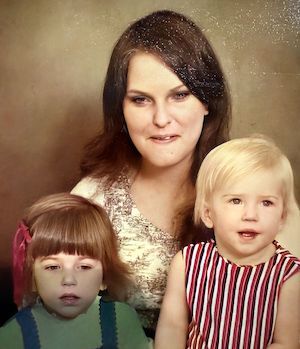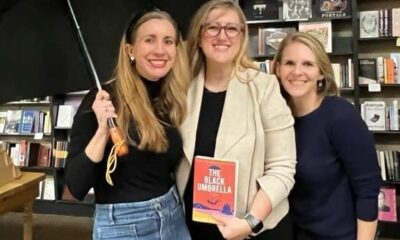Mississippi Today
A mother of two disappeared 45 years ago. She’s been found, buried under the name Jane Doe.

A mother of two disappeared 45 years ago. She's been found, buried under the name Jane Doe.
Tammie Mullins last saw her mother 45 years ago when she was 3 years old. Family members told her and her younger sister Christi that Tonya Mullins was missing and, if she were able to come home to them, she would.
Over the years, Tammie held on to happy memories of her mother from when they lived in Simpson County. She always wondered what happened to her or where she was.
Earlier this year, investigators from the Rankin County Sheriff's Department answered at least one of her questions: For 45 years, Tonya Mullins had been an unidentified homicide victim buried in Pearlunder the name “Jane Doe”. Investigators identified her remains using DNA testing and genealogy.
“That led her back to me and Christi,” said Tammie Mullins, who is 49.
In 1978, Tonya Mullins was 22 and married to her high school sweetheart, James. They moved from Texas to Mississippi with their young daughters in search of work.
The couple couldn't find jobs, so James went back to Texas to find a place to stay for his family, but when he returned to Simpson County, Tonya and the girls were gone.
That September, Rankin County investigators found the body of a woman – now identified as Tonya – wrapped in carpet in an illegal dumping site near the old Byram Swinging Bridge. The bridge spans the Pearl River and separates Hinds and Rankin counties.
The woman had been dead for several days. Based on the blunt force head injuries, the coroner ruled her death a homicide.
Her body was sent to the state forensics lab for an autopsy, and the woman's fingerprints were recorded and sent to the FBI. Information about her and a composite sketch were released to the public, but nobody came forward.
Tammie said memories of her mother are limited, such as images of her parents sitting next to each other on the couch as Tonya sewed Tammie's dress, or jumping on the trampoline together.
With the help of her grandparents and father, Tammie has been able to retell what happened when her mother went missing.
Three months after Tonya and the girls were last seen, Tammie's grandmother received a call saying their uncle would bring them to Texas if she and her father met him at the airport. The uncle brought Tammie and Christi and told their father that Tonya would reach out at a later time, but she never did.
Tammie said her father returned to Mississippi several times to try and find his wife, but was not successful.
Her uncle had told her father she saw Tonya leave with someone to go to Mexico. The uncle later said Tonya was in Florida. There was supposedly a letter James received from Tonya – which Tammie now knows could not have been possible – but she doesn't know what it said.
Tammie said growing up without her mother was an emotional rollercoaster.
She didn't like Mother's Day and still doesn't enjoy it now that she is a mother. At times she felt angry at her mother for leaving. Other times Tammie wished she was there, and that felt like a betrayal of her stepmother who helped raise her.
“I think those feelings just never go away,” Tammie said.
Years passed. Tammie and Christi started their own families. Tammie told her children about her mother. She became a grandmother.
In 2021, Rankin County Coroner David Ruth was reminded about the 1978 Jane Doe case after a detective from Ohio working on an unidentified missing person case reached out.
Ruth filed a petition with the circuit court to exhume Jane Doe's body with the hopes of using modern forensic tools to identify her. Once the request was approved, he and Deputy Coroner Clifton Dunlap collected bones to send out for testing.
Ruth tried three laboratories to help identify Mullins, and one that was successful was Texas-based Othram.
“There are a lot of homicides that are unsolved because people don't know who they are … finding out the identity of them is a start,” he said. “If you don't ask, you'll never know.”
Carla Davis, a Mississippi native and Othram's chief genetic genealogist, used DNA from Jane Done's bones to build a family tree.
Davis found the woman had a genetic match with a person who was adopted, and she had to find who that person's family was. Davis identified a possible close relative who agreed to take a DNA test.
More testing and work by investigators led to the positive identification of Jane Doe as Tonya Mullins.
“It's rewarding beyond measure,” Davis said about her genealogy work for Othram. “It's proof that, with funding, this works.”
Davis, who is also a philanthropist, funded the costs to exhume Mullins' body. She has also helped fund analyses for other unsolved cases in Mississippi and previously did genealogy work for Othram as a volunteer.
Ruth, the coroner, said Mullins' death is an open homicide investigation. Now that investigators know who she is, they can go back and find out with whom she was last seen and follow leads, he said.
Sheriff Bryan Bailey did not immediately respond to a request for comment Wednesday.
Learning what happened to her mother has given her and her family some closure, Tammie said, but she wants to know who is responsible for her death.
Next week, Tammie, Christi and other family members will travel to the Floral Hills Memory Gardens to have a funeral service for Tonya, which is where funeral home staff laid her to rest as Jane Doe in 1978.
Tammie said two of her sons who are ordained ministers will lead the service.
“It's the respect my mother deserves, and I wish we could have done this 45 years ago,” she said.
This article first appeared on Mississippi Today and is republished here under a Creative Commons license.
Mississippi Today
Supreme Court ruling sidesteps issue of spending public money on private schools
The Mississippi Supreme Court in a 7-2 ruling found that Parents for Public Schools does not have legal standing to challenge the constitutionality of the state Legislature sending public money to private schools.
The opinion, released Thursday, did not address the issue of whether the $10 million appropriation made in 2022 by the Legislature to private schools was constitutional.
Justice Robert Chamberlin of Southaven, writing for the majority, concluded Parents for Public Schools did not have standing to bring the lawsuit, in part, because harm to the public schools could not be proven.
Chamberlin wrote that the public education advocacy group says the legislative appropriation “will adversely affect the funding of public schools by legislating a competitive advantage to the independent schools who will receive the funds. This alleged future harm, however, is speculative and not sufficient to meet even Mississippi's permissive standing requirements.”
Coloring the ruling of the majority at least in part, is that the funds appropriated to the private schools were federal COVID-19 relief funds and not state money.
The office of state Attorney General Lynn Fitch had argued that the case should be dismissed because of lack of standing. Fitch's office did not immediately respond to a request for comment about the court's ruling.
Will Bardwell, an attorney for Parents for Public Schools, told Mississippi Today that the Thursday ruling was “outrageous” because the organization he represents had a “direct interest” in ensuring Mississippi's public schools were not undermined.
“This is not how courts are supposed to operate,” Bardwell said. “This is not how courts are supposed to work. When lawmakers ignore the constitution, courts are supposed to stand in their way. Other than Justice Leslie king and Justice Jim Kitchens, seven members of the Mississippi Supreme Court didn't do that today. And that's sad.”
The lawsuit revolved around Section 208 of the Mississippi Constitution, which declares simply that no public funds shall go to any school “that at the time of receiving such funds is not conducted as a free public school.”
During oral arguments before the Court in February, attorneys for Parents for Public Schools contended that it made no difference whether the funds were state or federal funds, only that they were public funds.
Parents for Public Schools argued that it was a group composed of parents of public school children so it should have standing to pursue the lawsuit.
Hinds County Chancellor Crystal Wise Martin agreed with that argument, but the state's highest court overturned her ruling.
Chamberlin wrote that because the funds were federal, “state taxpayer standing
is untenable under the facts of this case.”
Justice Leslie King of Greenville argued that Parents for Public Schools did have standing. King, who was joined in his opinion by Justice James Kitchens of Crystal Springs, questioned whether anyone would have standing to file a lawsuit under the majority's opinion.
King wrote, “The majority's holding today flies in the face of our longstanding liberal standing jurisprudence and severely limits the ability of Mississippi citizens to challenge government actions that violate the constitution.”
Mississippi Today's Taylor Vance contributed to this report.
This article first appeared on Mississippi Today and is republished here under a Creative Commons license.
Mississippi Today
IVF heir bill heads to governor’s desk
A bill to correct an outdated law barring in vitro fertilization children from next of kin inheritance passed both chambers Wednesday afternoon and now heads to the governor to be signed into law.
This is the fifth year Rep. Dana McLean, R-Columbus, filed the measure to give inheritance rights to children conceived via IVF after the death of one parent, as 27 other states have done. These bills died in the legislative process the last four years.
“What a relief … I am just so thrilled that after all this time we came to an agreement that will soon be law,” McLean said. “This will help countless families and children have the right to be able to receive these benefits as they should.”
McLean's legislation was inspired by the personal story of one of her constituents, Katie Studdard, whose 5-year-old daughter has been denied Social Security benefits from her late biological father since birth.
“And that's how a lot of bills that we end up sponsoring come to us – from stories, from an issue someone is having where we need to make adjustments to state law,” McLean said.

Studdard, who lives in Columbus, started fertility treatments with her late husband, Chris McDill, before he died of cancer. She did not have success with the embryos while her husband was alive, but decided to continue trying for a baby after her husband's death. She conceived her daughter Elyse a year after her husband died.
House Bill 1542 passed the House unanimously in mid-March and overwhelmingly passed the Senate in mid-April at the eleventh hour. But the Senate passed it with a reverse repealer, referring it to conference in the hopes of expanding the bill beyond its original scope to protect in vitro fertilization and other forms of assisted reproduction, in the wake of recent events calling fertility treatments into question in Alabama.
Ultimately, that was too big a task to take on at the end of the session, with pro-life groups coming out publicly to express concern about new language they didn't have time to vet, explained Sen. Joey Fillingane, R-Sumrall. Fillingane was one of the lawmakers tasked with debating the details of the bill in conference.
House and Senate conferees reverted the bill back mostly to its original language and were able to achieve the primary goal of securing inheritance rights for posthumously-conceived children with the final version. In addition to that goal, Fillingane said, conferees were able to come up with a definition for “alternative reproduction,” which didn't previously exist in Mississippi.
“I think Chairman (Brice) Wiggins and Chairman (Joey) Hood (of the Judiciary A committee where the bill was assigned) thought … ‘let's get this issue addressed for this family in Columbus that has waited (five) years … and let's at least get a definition in place sort of as a starting point to build a framework out hopefully over the next sessions to add to protect the IVF procedures and processes and surrogacy,'” said Fillingane.

Fillingane had two of his own children through surrogacy, but traveled to California to do so – because the state has clear statutory guidelines around parental rights in surrogacy cases.
“I did not feel comfortable having my kids in Mississippi … there were absolutely no protections that the state of Mississippi offers for parents who have children this way. As a family lawyer, I was uniquely situated to see some of these things,” he said.
Senate Judiciary A Chairman Brice Wiggins, R-Pascagoula, who was instrumental in getting the bill to the finish line, wasn't available for comment.
Although it's been a trying few years, Studdard said she has a newfound appreciation for the Legislature. As a teacher, she has live streamed floor debates during her lunch period at school, has become acquainted with the legislative language of various iterations of the bill, and talked extensively with lawmakers. She says that every time she hears a new legislative word that she doesn't know, she googles it.
“I've learned a lot,” she said. “I think anybody going through any life-changing event, like I did with (my husband's) cancer, and then IVF, and now this bill …you gain a whole new appreciation and so much knowledge you never thought you'd know.”
Studdard is overjoyed that the Senate proposed naming the law after her late husband, Chris McDill, and is proud to model for her daughter and her students that it is possible for an everyday person to enact policy change.
Primarily, she hopes the benefits her daughter will start receiving next year will go toward her future education.
“I just think this financially will create so much security for her and her education, that's number one for me,” Studdard said. “I want her to not have to worry about taking out a student loan. I want her to have a good financial start to life when she goes to college. To be able to hand that to your child is a gift.”
When McLean first authored a bill to address Studdard's predicament, it was the first year of her first four-year term. Now, it's the first year of her second term, and she says it feels full circle.
“When (Studdard) first told me about her little girl and being a single mom, at that time Elyse was just a baby, and it really hit home to me because I am also a single mother of a daughter, and I understood the significance of this and how we really need to protect children and women and mothers and families,” McLean reflected. “I felt like it was really something I could get behind.”
This article first appeared on Mississippi Today and is republished here under a Creative Commons license.
Mississippi Today
Belhaven man’s widow will decide what will be done with his remains, but independent autopsy will be done
A Hinds County chancery judge has removed the brother of Dau Mabil from a lawsuit filed against the man's widow that would have allowed him to gain access to his brother's body for an independent autopsy.
Judge Dewayne Thomas issued two orders Thursday morning several days after a hearing in a lawsuit between Bul Mabil and Karissa Bowley, along with state investigators, about what will happen to Dau Mabil's remains.
In the hearing and court filings, Bowley said she will allow an independent autopsy to be conducted.
“I do feel relief that this part of things is over and we can move on to what we were doing before, which is continue to dig for information,” she said Thursday after the judge's orders were released.
On March 25, the 33-year-old Belhaven resident went on a walk in his usual area without his phone. He was seen on video surveillance on Jefferson Street between Fortification and High Street, and at one point went to the Museum Trail in Belhaven Heights to check on corn he planted.
About three weeks later, a fisherman spotted a body floating in the Pearl River near Lawrence County, more than 50 miles away. By April 18, a preliminary autopsy revealed the body belonged to Mabil. The Lawrence County sheriff said there was no evidence of foul play.
In his order, Thomas imposed safeguards proposed by Bowley and the Department of Public Safety for the independent autopsy: It needs to be conducted after the state finishes its investigation and be conducted by someone who is a qualified pathologist with a certain medical degree and certification.
After the state finishes its investigation, official autopsy results shall be released only with consent of Bowley, as the surviving spouse and next of kin, according to the court order.
Bowley is awaiting the report from the first autopsy to shed more light on what happened and whether anyone from the public knows anything or has any video from the day Mabil disappeared, including video Bul Mabil's attorney mentioned that supposedly shows people at the Museum Trail moving that appears to be a body into a truck around the time Mabil was at there.
The Department of Public Safety will hold Mabil's remains for 30 days after the state finishes its death investigation so the independent autopsy can be done.
Bul Mabil filed the lawsuit the night before his brother's body was identified because he believes it is the only way to know whether there was foul play in his brother's death. U.S. Rep. Bennie Thompson has asked the Justice Department to investigate.
In a separate order, Thomas agreed that Bowley, as Mabil's surviving spouse, is Mabil's next of kin and the one who can direct what happens with his remains.
He dismissed Bul Mabil as a plaintiff because he lacked standing in the matter.
At a Tuesday hearing, his attorney, Lisa Ross, argued that he should be Dau Mabil's next of kin because his brother and Bowley had a strained relationship leading up to his disappearance. Ross said Mississippi has no existing case law that defines who is a surviving spouse, but referenced a New York case in which a wife separated from her husband was not allowed to cremate his body and interfere with the mother's request for an autopsy.
He has also argued in court records that he should remain in the case because he is the next of kin for Dau's child.
Ross could not be reached about whether she plans to appeal.
The lawsuit has been renamed to reflect the new parties: Bowley v. Mississippi Department of Public Safety.
Now that the judge has written the orders, Bowley said she feels relieved and has more freedom to grieve her husband, including visiting places around the city where they went together.
One of those is the patch along the Museum Trail where Mabil planted corn. Bowley said she's returned there to water the plants and see them grow.
“It's a nice place to be reminded of him along with many others,” she said.
This article first appeared on Mississippi Today and is republished here under a Creative Commons license.
-
Mississippi Today4 days ago
On this day in 1951
-
Mississippi News5 days ago
One injured in Mississippi officer-involved shooting after chase
-
SuperTalk FM3 days ago
Festival merger in Leland sets up one major event for Mississippi Delta
-
Mississippi News2 days ago
Two women accused of shoplifting across southeast captured in Mississippi
-
SuperTalk FM3 days ago
PERS bill set to phase in employer rate increase heads to governor’s desk
-
Mississippi Business2 days ago
Geartek expanding operations in Alcorn County
-
SuperTalk FM6 days ago
Investigation underway after gun found in backpack of Ridgeland High School student
-
SuperTalk FM6 days ago
Mississippi Senate throws curveball, sets spiral in motion for brand new public school funding formula










































